From Clinton to Biden: a look back on 30 years of US LEADERSHIP
What you want to understand: 🤔
- How did Bill Clinton revert his position on NATO enlargement?
- What is pragmatic Wilsonianism i.e. Bill Clinton’s approach to international relations?
- Why George W. Bush can be regarded as a falcon with regards to its foreign policy?
- Why was the 2001 Patriot Act so controversial? Why was the war in Iraq so controversial as well?
- What is the concept of smart power developed under Barack Obama’s presidency? What does the Pivot to Asia mean?
- Why did Barack Obama receive the Nobel Peace Prize in 2009?
- Who are the Angry White Men that voted for Donald Trump?
- How did Trump’s unilateralism materialise?
- Can the US-China rivalry be qualified as a Thucydides trap?
- Why does Joe Biden’s rhetoric revolve around Democracy vs. Autocracy?
- Does Joe Biden really embody a return to multilateralism?
I. Bill Clinton

Presidency: 1993-1997 and 1997-2001
Political affiliation: Democratic Party
Vice-President: Al Gore
A. Dealing with domestic economic difficulties
Bill Clinton inherited an economy in disarray as a result of the Reaganomics i.e. economic policies implemented by Ronald Reagan (1981-1989) and whose consequences hadn’t been dealt with by George Bush (1989-1993). These policies had lowered taxes for the richest and increased military spending. It had led to economic stagnation and massive deficits.
With the end of the USSR in December 1991 and the boom of the new information and communication technologies, the US experienced a steady and strong economic growth during Bill Clinton’s mandates. However, he didn’t manage to reform the US health care system as his proposals were deemed too expensive and unequal.
At the beginning of his mandate, Bill Clinton overlooked foreign affairs in order to tackle economic issues and reduce budget and trade deficits.
B. Foreign policy
Pragmatic Wilsonianism
In 1992, President Bush launched Operation Restore Hope in order to bring peace to Somalia where rebel factions were fighting each other. The objective was to show the international community that the US could intervene militarily abroad just for restoring peace and without any hidden interest. After the killing of 18 US soldiers in 1993, newly-elected President Clinton decided to withdraw his troops from the country.
This episode has served as a lesson: the US understood that it should only engage its army in regions where its strategic interests are at stakes. That’s why Bill Clinton didn’t send troops in Rwanda in 1994 and was reluctant to intervene in the various Balkan wars in the 1990s. Besides, Bill Clinton’s foreign policy focused primarily on spreading democracy and the principles of market economy worldwide.
Therefore, we can describe Bill Clinton’s foreign policy as pragmatic Wilsonianism (Pascal Boniface, Géopolitique illustrée – Les relations internationales depuis 1945, p.212, 2022) in the sense that it combined a defence of US interests with an ambition to spread US values across the world.
Wilsonianism: approach to international relations developed by the US President Woodrow Wilson (1913-1921) and that was highlighted in 1918 with his famous Fourteen Points. He promoted multilateralism and open diplomacy (no secret treaties), collective security, the right of the peoples to self-determination, liberal democracy and humanitarian interventions.
In a pragmatic Wilsonian approach Bill Clinton refused to ratify the Comprehensive Nuclear-Test-Ban Treaty (1996) and the Kyoto Protocol on global warming (1997) as he deemed them to be harmful to US interests. He also rejected the Ottawa Treaty aka Anti-Personnel Mine Ban Convention (1997).
President Clinton also used the term “Rogue States” that was coined by Ronald Reagan to refer to authoritarian States that behave aggressively on the international stage and that potentially seek to obtain nuclear weapons like Iran, Iraq, Syria, Libya or Cuba.
In the Middle East
The US, along with the UK, bombed specific targets in Iraq as of 1998 because it considered that the country was acquiring weapons of mass destruction. It also launched strikes in Afghanistan and Sudan in 1998 and 1999 in retaliation to attacks against US embassies in Kenya and Tanzania.
Furthermore, Bill Clinton managed to bring together Israelis and Palestinians to the negotiation table in Camp David in 2000. However, he actually failed to reconcile them and to make them sign a peace agreement.

In Europe
NATO enlargement:
In Europe, Bill Clinton wanted to maintain the US influence through the enlargement of NATO. Even though he publicly declared his opposition to it during his first mandate, he later announced during the 1996 presidential campaign (under the pressure of the Polish community in the swing state of Illinois) that he was in favour of enlarging the Organisation to Eastern Europe. Eventually, Poland, Hungary and the Czech Republic joined the Atlantic Alliance in 1999.
Former members of the Warsaw Pact actively pushed for further enlargements of NATO as they saw the US as a security guarantee against Russia. While Eastern European countries feared Russia’s ambitions, it was actually the latter’s weakness at the time that paved the way for NATO enlargements. In fact, Russia was too focused on its internal divisions and its restructuration to react.
Wars in Yugoslavia:
During the war in Bosnia (1992-1995), NATO launched strikes against Serbian forces to help Bosniaks and Croats, with mixed results though. The Serbs were then forced to sit at the negotiation table, which resulted in the adoption of the Dayton Agreement (December 1995).
In March 1999, NATO intervened in Kosovo, despite Yugoslavia’s refusal. As a matter of fact, NATO regarded the situation in Kosovo as a “humanitarian war”. The Alliance then performed air strikes on Serbian positions. However, these bombings were not approved by the UN, their usefulness was sometimes questioned and they also killed hundreds of civilians.
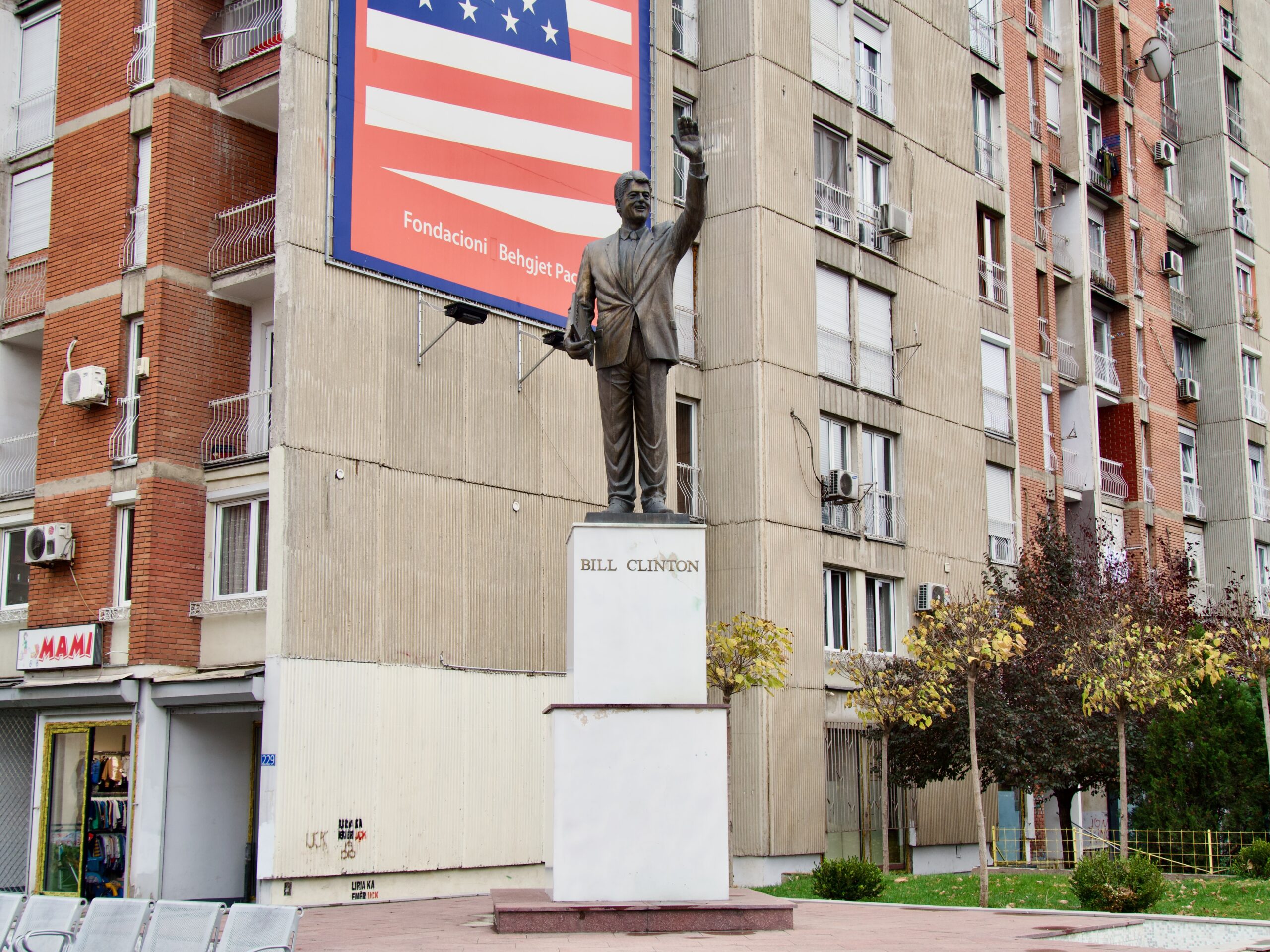
Iran and North Korea
Besides, there were hopes for improvement in the relations with Iran and North Korea, with no further development and concrete action though. For example, in 2000, the State Secretary Madeleine Albright visited the North Korean leader, Kim Jong Il.

C. Political Scandal
At the beginning of his second mandate, Bill Clinton got entangled in the Monica Lewinsky affair. While she was a young intern at the White House, she had sexual intercourses with the President. The latter first denied the allegations before admitting that he had lied. An impeachment procedure was launched by Republicans but it failed to pass as the Senate acquitted Bill Clinton.
Political scandals, rising economic inequalities and diplomatic difficulties tarnished Bill Clinton’s record.
II. George W. Bush

Presidency: 2001-2005 and 2005-2009
Political affiliation: Republican Party
Vice-President: Dick Cheney
A. Contested elections
During his campaign, George W. Bush advocated for a more modest strategic role on the international stage, criticising Bill Clinton for investing too much in world affairs with only limited benefits for the US.
In the race to the White House, he was facing Al Gore, Bill Clinton’s Vice-President. The latter obtained more popular votes but lost the election to a small margin because presidential electors favoured George W. Bush.
There were allegations of irregularities in the State of Florida, whose governor was George W. Bush’s brother, where many Black voters were prevented from casting their ballot. The Black community in the US tends to lean more towards the Democrats than the Republicans.
B. A realistic approach to international relations
When he rose to power in 2001, George W. Bush had no experience in the field of international relations. He surrounded himself with “falcons” whose approach to foreign affairs could be characterised as follows: binary conception of reality (good/bad), low tolerance for diplomatic processes and multilateralism, and tendency to favour military means.
As a matter of fact, George W. Bush adopted “America First” as his motto. The US refused multilateralism since it saw international organisations like the UN as inefficient and made up of too many countries that didn’t share its values. Indeed, the US gave much importance to spreading its values and its political and economic system worldwide. It considered its model of society to be the basis on which international stability could be achieved.
You’ll find below a short account of the 3 main theories of International Relations:
Realism → in an anarchical international system, States compete for power in order to defend their selfish interests and ensure their survival. We can make a parallel with Hobbes famous phrase: “Man is a wolf to man”. There is little possibility for peaceful cooperation since trying to make the world a better place is vain.
Liberalism → still in an anarchical international system, States can cooperate and create organisations like the UN to decrease anarchy and pacify international relations (unlike realists who think that the state of the world cannot be changed and reality should be accepted as it is). Liberals believe that power can be reached through economic means, which can actually eliminate the possibility for armed conflicts by creating greater interdependence between States.
Constructivism → international relations are like social relations where States define their national interests according to their identity, perception of themselves and of others around them, and their perception of their environment. Individuals’ personal ideas and norms rule international relations.
C. The aftermath of the 9/11 attacks
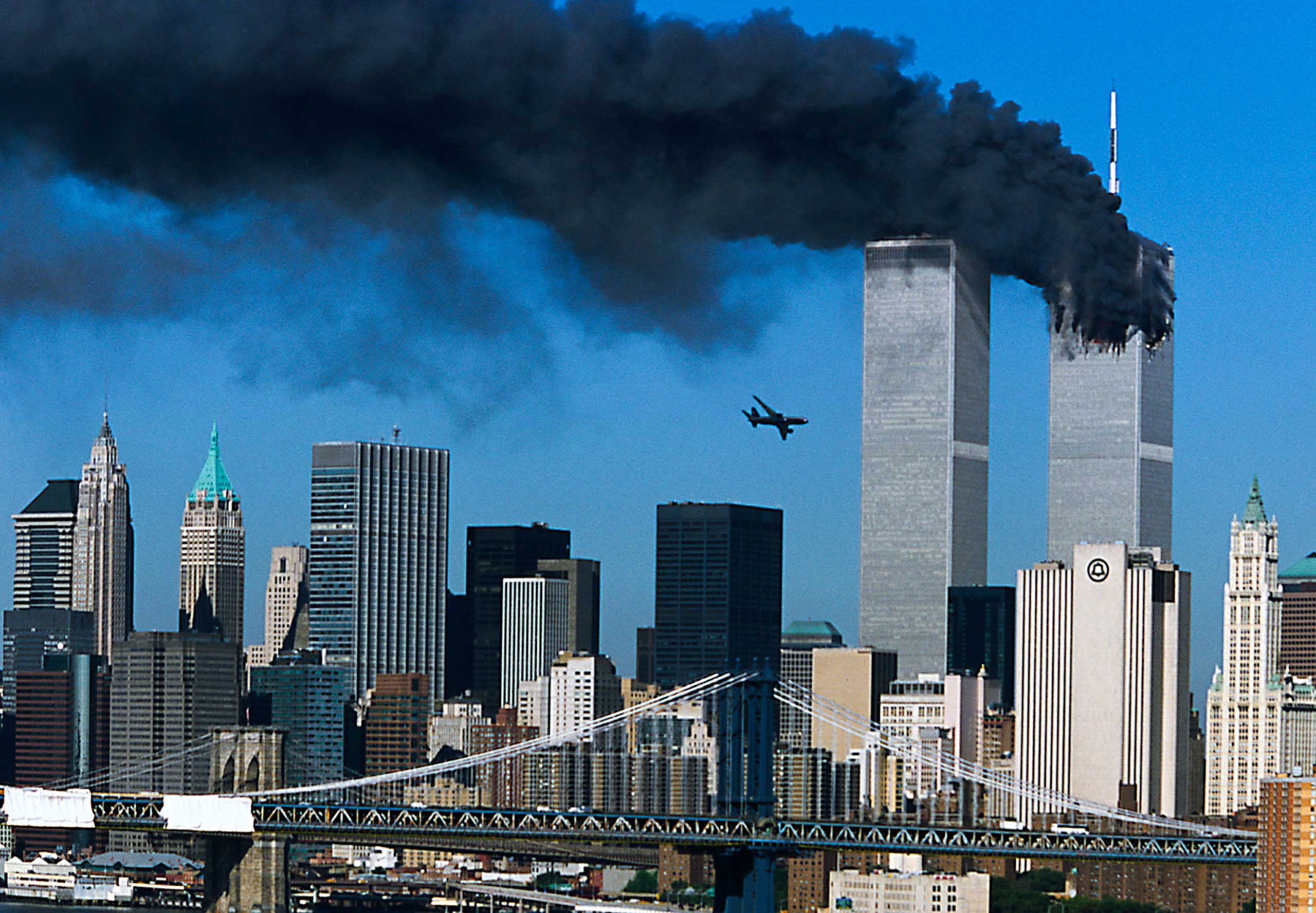
The last time the continental territory of the US had undergone an attack (so not Pearl Harbour on December 7, 1941) was in 1814 during the Burning of Washington by the British.
In 2001, the Americans were shocked as they thought they were out of reach and that no one could possibly have such a hatred for them and their values.
They had to hold someone responsible for these terrorist attacks. They found him in Osama Bin Laden, the head of al-Qaeda. He was living at the time in Afghanistan under the protection of the Taliban.
Therefore, on October 7, 2001, George W. Bush decided to deploy troops in Afghanistan, with the approval of the international community, as an act of legitimate defence. Within 2 months, operation Enduring Freedom managed to overthrow the Taliban, but Bin Laden fled.
The US President also enacted the Patriot Act to reinforce State capacities to fight terrorism. For instance, State authorities could search private properties and records without their owners’ consent and knowledge. The US government could also detain without limit anyone suspected of terrorist activities without having to provide any official indictment. After several extensions, the Patriot Act expired in 2020 as the US Congress didn’t prolong it.
During George W. Bush’s first mandate (2001-2005), defence expenditures increased from $280 billion to $450 billion (+60%) in order to sustain the war effort in the Middle East.
D. The war in Iraq (2003)
He launched a pre-emptive war in Iraq with the official objectives to fight terrorism and the proliferation of weapons of mass destruction. Even though the operation didn’t produce any satisfying results and caused the death of many US soldiers, George W. Bush got re-elected in 2004 because he appeared as a war leader who also managed to boost economic growth during his first term in office.
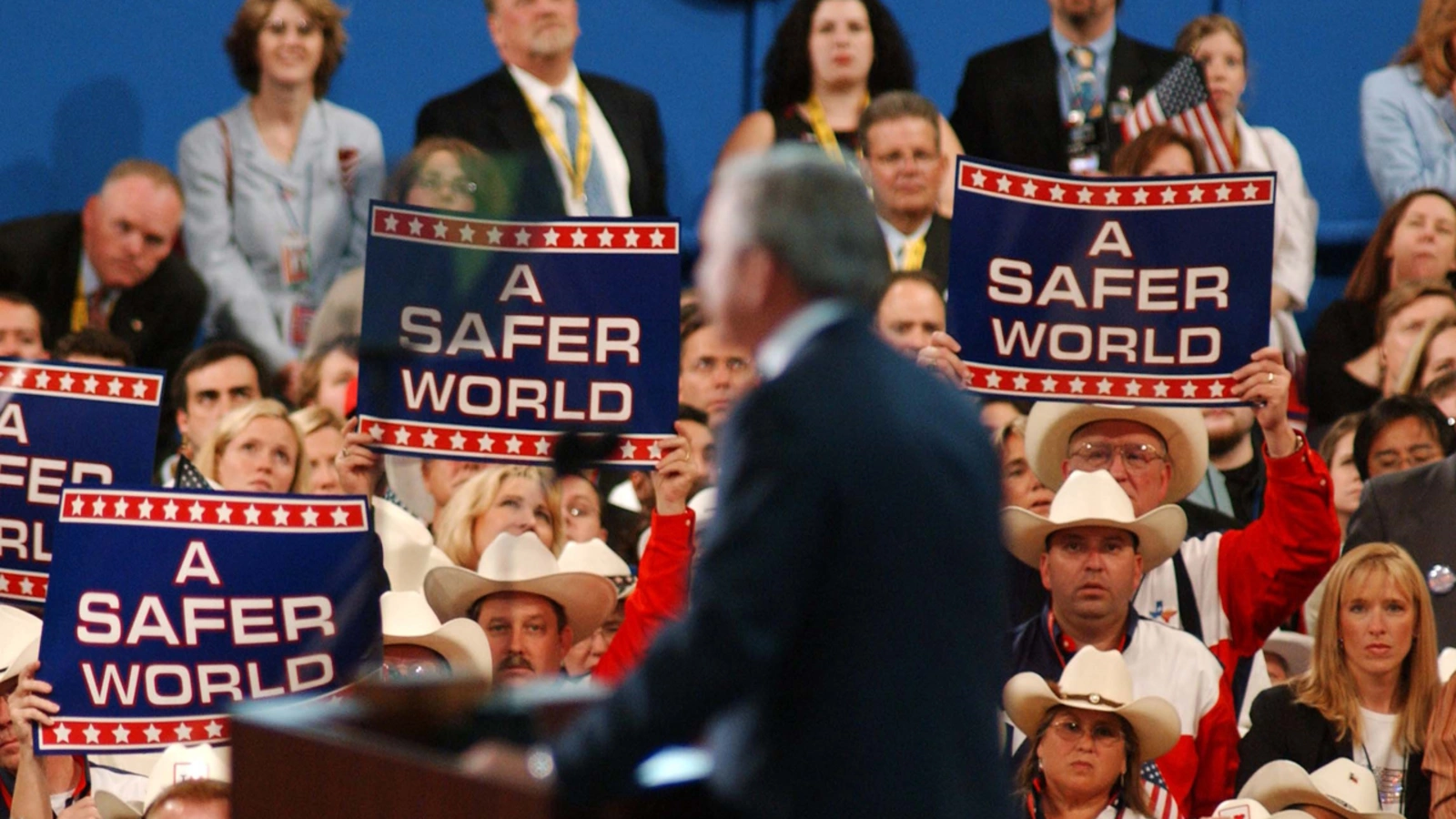
Nevertheless, he got a bad reputation vis-à-vis the international community for the following reasons:
- Unilateralism and contempt for international organisations
- The US decided unilaterally to launch a pre-emptive war in Iraq
- Even though in 2002 the UN Security Council adopted resolution 1441 and warned Iraq of “consequences” if it didn’t forego its weapons of mass destruction, these “consequences” had never been decided upon collectively by the Security Council
- No UN Security Council resolution explicitly authorised this war
- Kofi Annan, the UN general secretary, declared that the war wasn’t in compliance with the UN Charter
- Military blunders and cases of mistreatments by US soldiers in Afghanistan and Iraq
- The use of the Guantanamo Bay detention camp within the framework of the Patriot Act
- It was located in Cuba so that detainees weren’t subject to US laws
- According to the Patriot Act, detainees were considered as “illegal combatants” and therefore were not protected by international laws as prisoners of war
- There have been reports of abuses, degrading treatments and torture
E. Socio-economic policies
Under George W. Bush, trade and budgetary deficits as well as inequalities surged. His popularity dropped dramatically in 2005, when we was too slow to react (as he was on vacation in his Texas ranch) and appeared detached from the disaster caused by hurricane Katrina that hit New Orleans. Besides, unemployment, indebtedness and political scandals worsens even more George W. Bush’s popularity. On top of that, thousands of US households were evicted in 2008 due to the subprime financial crisis.
III. Barrack Obama

Presidency: 2009-2013 and 2013-2017
Political affiliation: Democratic Party
Vice-President: Joe Biden
A. New hopes for peace
Barack Obama’s top priority was to establish, maintain or restore good relations with the rest of the international community. In this endeavour, he considered that the US had to strive to be exemplary by aligning its actions with its discourse.
He developed the concept of smart power, a combination of hard power and soft power.
Hard power (to coerce) is based on military power, economic domination and control of natural resources
Soft power (to co-opt) is based on culture, education, values, economic aid, diplomacy and institutional cooperation
Smart power is a combination of soft power, to legitimise and politically exploit victories obtained with hard power, and hard power, to provide might and to secure the basis of a country’s soft power.
The Middle East
In Cairo in 2009, Barack Obama set out his ambitions to renew trust with Middle-Eastern Muslim countries. He then received the Nobel Peace Prize in 2009, more for his intentions than for his actions.
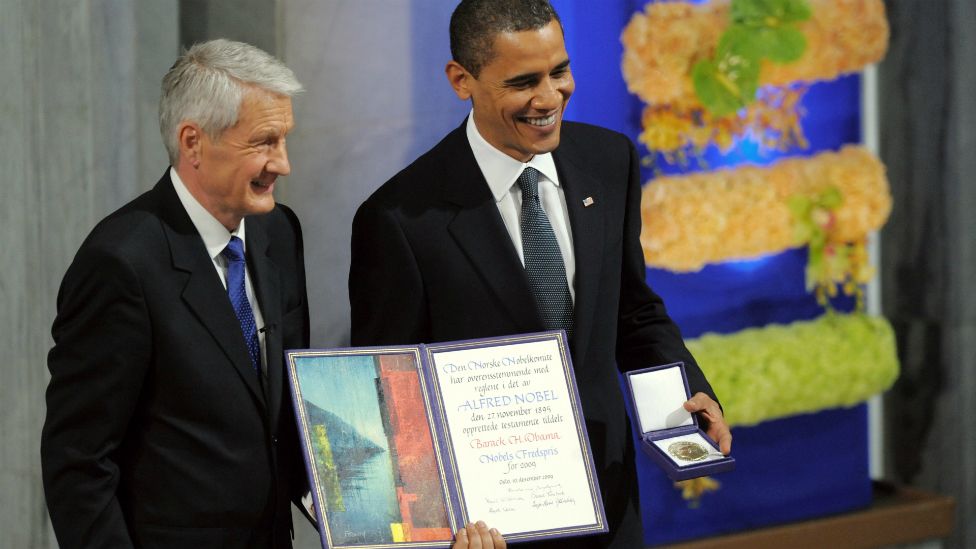
Barack Obama opposed the war in Iraq in 2003 and thus he progressively withdrew troops from Iraq. However, in parallel, he increased those present in Afghanistan (up to 100,000 soldiers) until 2011 when Osama Bin Laden was killed by Navy Seals in Pakistan. He then gradually withdrew most of them. Obama’s popularity soared following this operational victory.
However, relations with Israel deteriorated during Barack Obama’s mandates. Indeed, Israel reproached the US for being too accommodating with Iran on the 2015 nuclear deal. Furthermore, Barack Obama didn’t manage to shape a peace agreement between Israel and Palestine as he had to confront Benjamin Netanyahu about Israeli colonies that were extending on Palestinian territories.
Moreover, in Syria in 2014, Barack Obama didn’t follow through with threats against Bashar al-Assad’s regime that used chemical weapons against its population. In fact, he had initially set a red line on the use of chemical weapons but the fear of getting entangled again in a war in the Middle-East prevented him from ordering retaliation strikes.
Russia
During his time at the White House, Barack Obama wished to reset relations with Russia. That’s why, in 2010 with President Medvedev, he signed the New START, which is a nuclear arms reduction treaty.
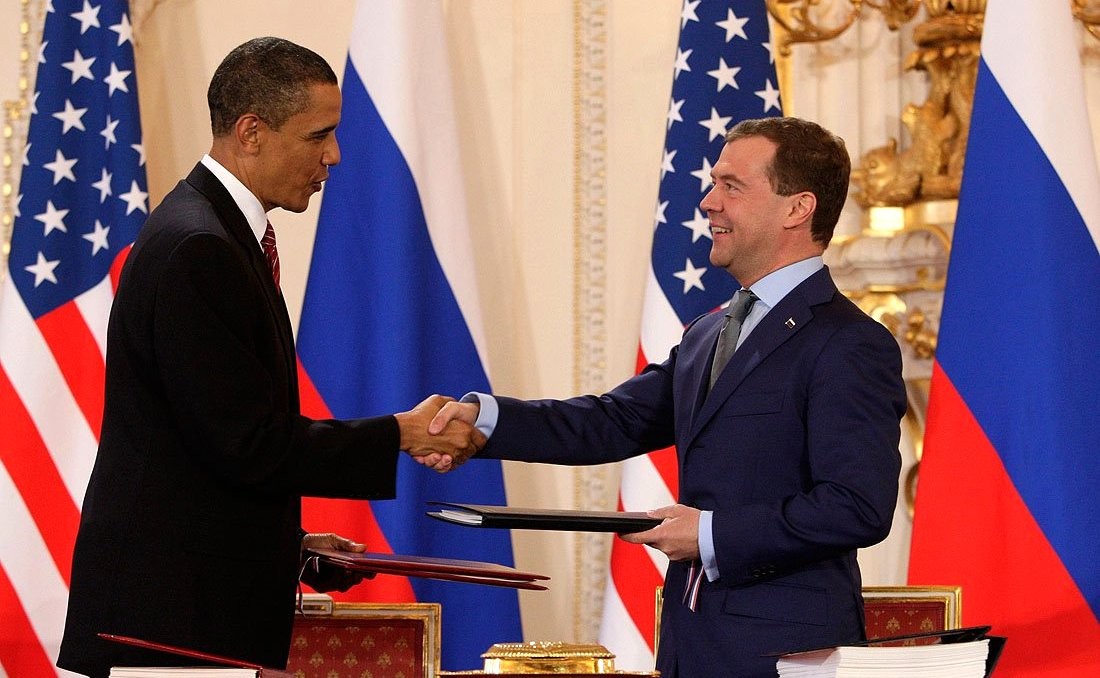
The “Pivot to Asia”
The “Pivot to Asia” policy was designed by Kurt Campbell, Assistant Secretary of State for East Asian and Pacific Affairs. The idea was to shift the focus to the Asia-Pacific region at the expense of Europe (no longer of strategic importance) and the Middle East (too many disappointments). The US wanted to counter-balance China’s weight through multilateral agreements with its neighbours. However, the “Pivot to Asia” has had mixed results partly due to Barack Obama’s reluctance to adopt a hard line on China’s military activities in the South China Sea.
Whistle-blowers
The US international prestige was affected by multiples revelations on abuses committed during the wars in Afghanistan and Iraq (the WikiLeaks organised by Julian Assange with the help of Chelsea Manning). Edward Snowden has also unveiled the extent of the National Security Agency’s surveillance practices, highlighting that leaders of allied countries like Germany’s Angela Merkel have been spied on.

B. Domestic policies
During his 2008 campaign, Barack Obama had presented himself as a Black candidate and not as a candidate of the Blacks.
He endeavoured to reform the health sector by implementing the Obamacare. His ambition was to provide every US citizen with a health insurance cover. However, the Republicans opposed this project and refused to raise the debt ceiling, which led to a shutdown of the US administration. Eventually, the debt ceiling was raised and the Obamacare implemented.
However, it is worth noting that under Barack Obama’s presidency, the levels of the public federal debt as well as of the private debt skyrocketed.
IV. Donald Trump
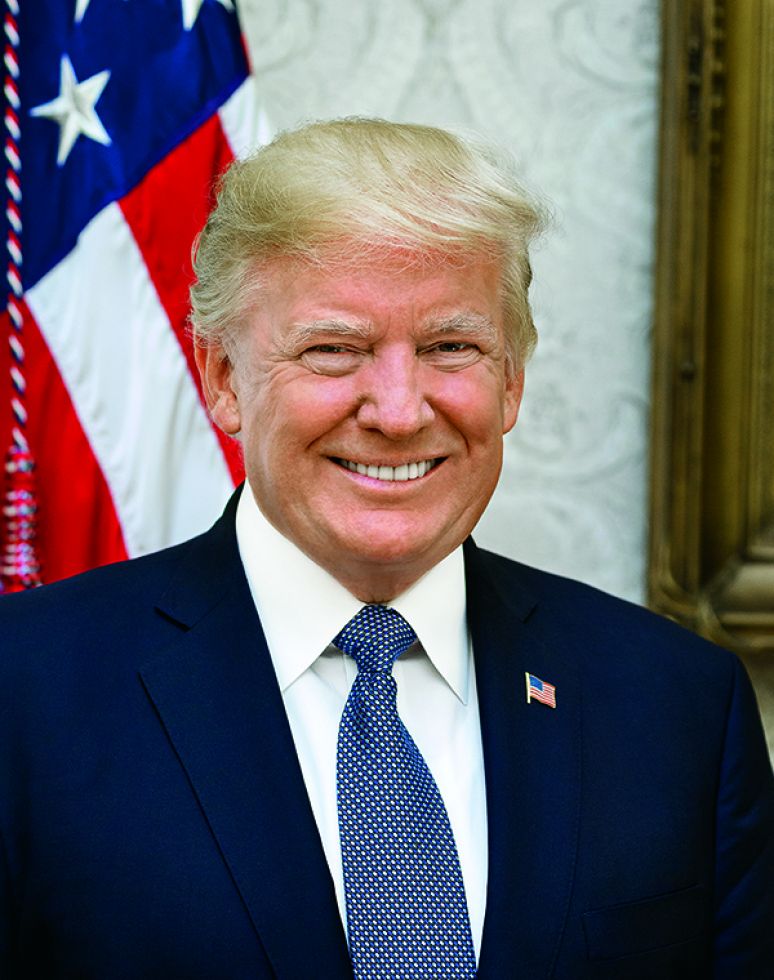
Presidency: 2017-2021
Political affiliation: Republican Party
Vice-President: Mike Pence
A. Criticism of globalisation
Donald Trump became President as he managed, unlike Hilary Clinton, to speak to popular classes and especially to “Angry White Men” who felt downgraded as a result of globalisation and the affirmation of minority rights. The election of Donald Trump polarised even more the American society. The more the media and the elites criticised him, the more it fanaticised his electoral base.
Donald Trump considered that the US was a victim of globalisation and strongly criticised it whereas China had become one of its leading figures.
The European Union was even seen as an enemy by the Trump administration as the US had a trade deficit (imports > exports) of more than $150 billion with the EU.
B. Unilateralism and isolation from its partners
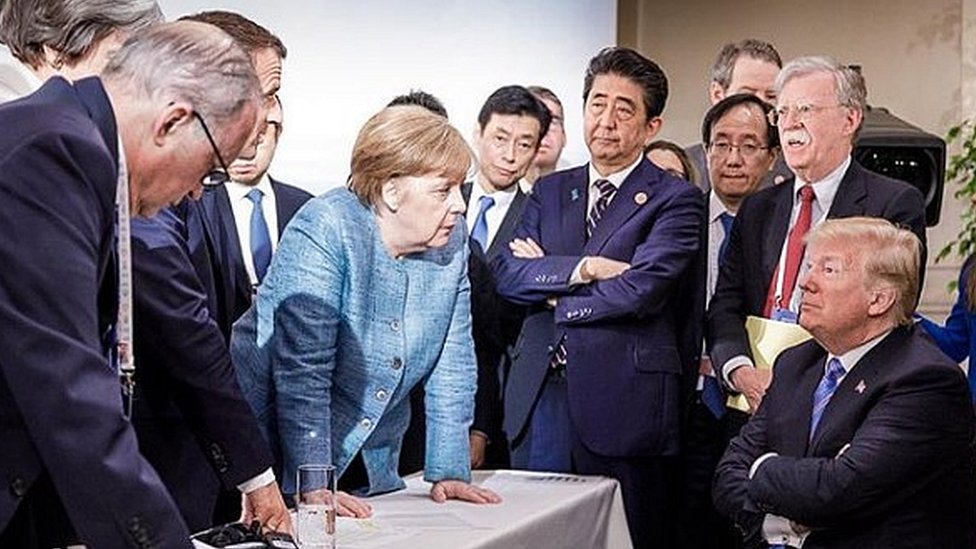
Barack Obama and Donal Trump agreed on the fact that the US couldn’t be the world’s policeman anymore and that recent interventions abroad failed (Iraq, Afghanistan and Libya). On one hand, Obama concluded that the US had to promote multilateralism as its hegemony had faded away. On the other hand, Trump opted for unilateralism in order to protect US interests from other countries’ growing influence.
Russia
Because of allegations of collusion with Russia during his campaign, and because of counter-powers in the Pentagon and the Congress, Donald Trump didn’t manage to establish friendly relations with Putin’s regime.
NATO
Like Barack Obama before him, Donald Trump complained about the cost of the US participation in NATO. He threatened to leave the Atlantic Alliance so that European countries would increase their defence budget to at least 2% of their GDP.

In parallel, Trump raised the US defence budget by 22% during his mandate.
Mexico
Donald Trump castigated South-American and Mexican migrants for bringing crime to the US. That’s why he unilaterally decided to build a wall at the border with Mexico, for which the latter had to pay. Mexico refused to comply with the US President’s demand.
The Middle East
Besides, in January 2017, the US President imposed a travel ban on 7 Muslim countries (Iran, Iraq, Syria, Yemen, Libya, Sudan, and Somalia) for “security reasons”.
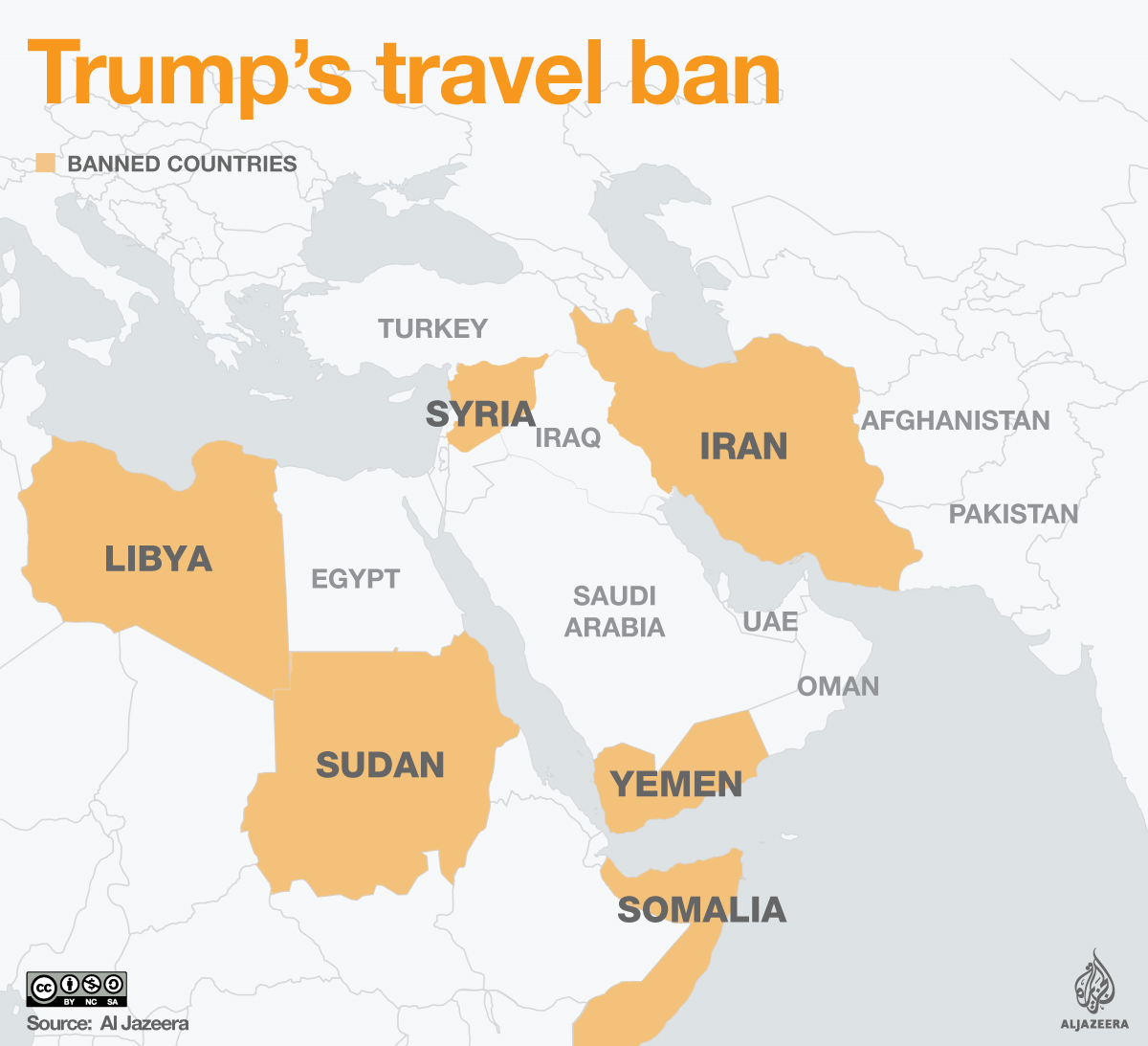
Tensions between the US and the Muslim world worsened when Donald Trump decided to move the US embassy in Israel from Tel-Aviv to Jerusalem in May 2018 and to recognise Jerusalem as the capital of the Jewish nation in March 2019.
In May 2018, the US also withdrew from the 2015 Iran nuclear deal. It received criticisms from the entire international community except for Israel and Saudi Arabia. The US also imposed sanctions on companies that would trade with Iran in order to isolate the country and potentially spark popular revolts against the mullahs’ regime.
Unlike his predecessor who advocated for a balanced use of hard and soft powers, Donald Trump almost solely resorted to hard power at the expense of the other. For instance, the US withdrew from the 2015 Paris climate agreement and the UNESCO (loss of soft power) while imposing economic sanctions on Iran, Cuba and Venezuela to choke them and advance US interests (use of hard power).
C. The US-China rivalry
During Donald Trump’s mandate, China constituted the main source of concern for the US.
On an economic standpoint, it was such not only because the US trade deficit rose to more than $400 billion in 2018 (which he significantly reduced by waging a trade war), but also because China allegedly committed thefts of intellectual property.
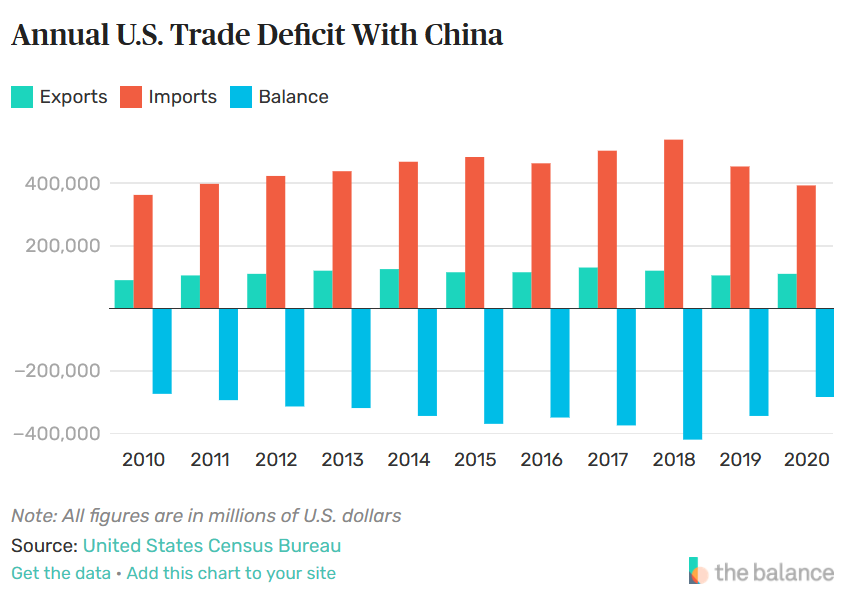
When China entered the World Trade Organisation in 2001, its GDP represented 10% of the US GDP. Two decades later, it represented around 70% of the US GDP: a clear sign that the Chinese economy is catching up fast.
As China was turning into a global economic superpower in the 2000s and 2010s, it progressively acquired a status of regional and even global political and military power that could compete with the US or at least hinder its ability to impose unilaterally its will. It is notably the case in the Indo-Pacific region, especially in the South China Sea.
US-China relations epitomise the concept of the Thucydides trap.
Thucydides trap: situation in which the hegemonic power (the US after the Cold War) doesn’t accept to be challenged and potentially toppled by an emerging power (China). Therefore, the hegemonic power strives to maintain its status by waging war to keep the second power at bay. Thucydides used this theory to explain the Peloponnesian war (431–404 BC) that occurred between Sparta and its rival Athens.
Donald Trump’s poor handling of the COVID-19 pandemic led him to use China as a scapegoat for all the ills the US suffered from during the crisis. Moreover, the rivalry with China is one of the few topics on which both Democrats and Republicans find common ground.
V. Joe Biden
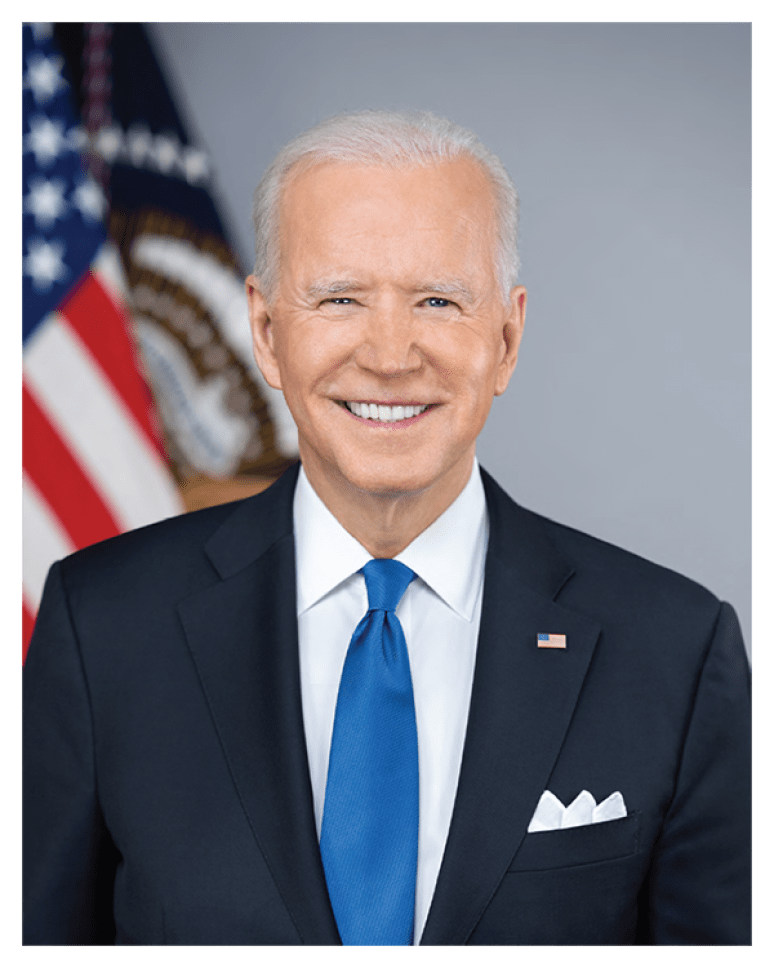
Presidency: 2021-2025
Political affiliation: Democratic Party
Vice-President: Kamala Harris
A. A divided US society
On January 6, 2021, Donald Trump’s supporters stormed the Capitol on the day of Joe Biden’s inauguration. The images of a fragile and divided US democracy spread around the world.
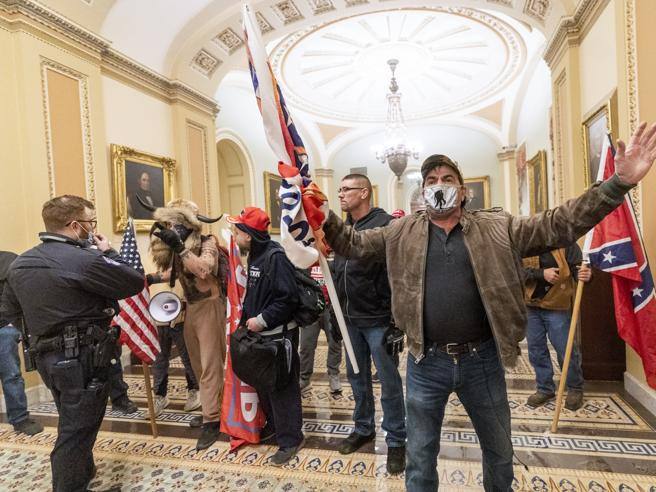
After Donald Trump’s presidency, the US Supreme Court was made up of 6 conservative and 3 progressive judges. Therefore, in June 2022, the Supreme Court could abolish the constitutional right to abortion at the federal level (states could thus decide for themselves), which divided even more the US society.
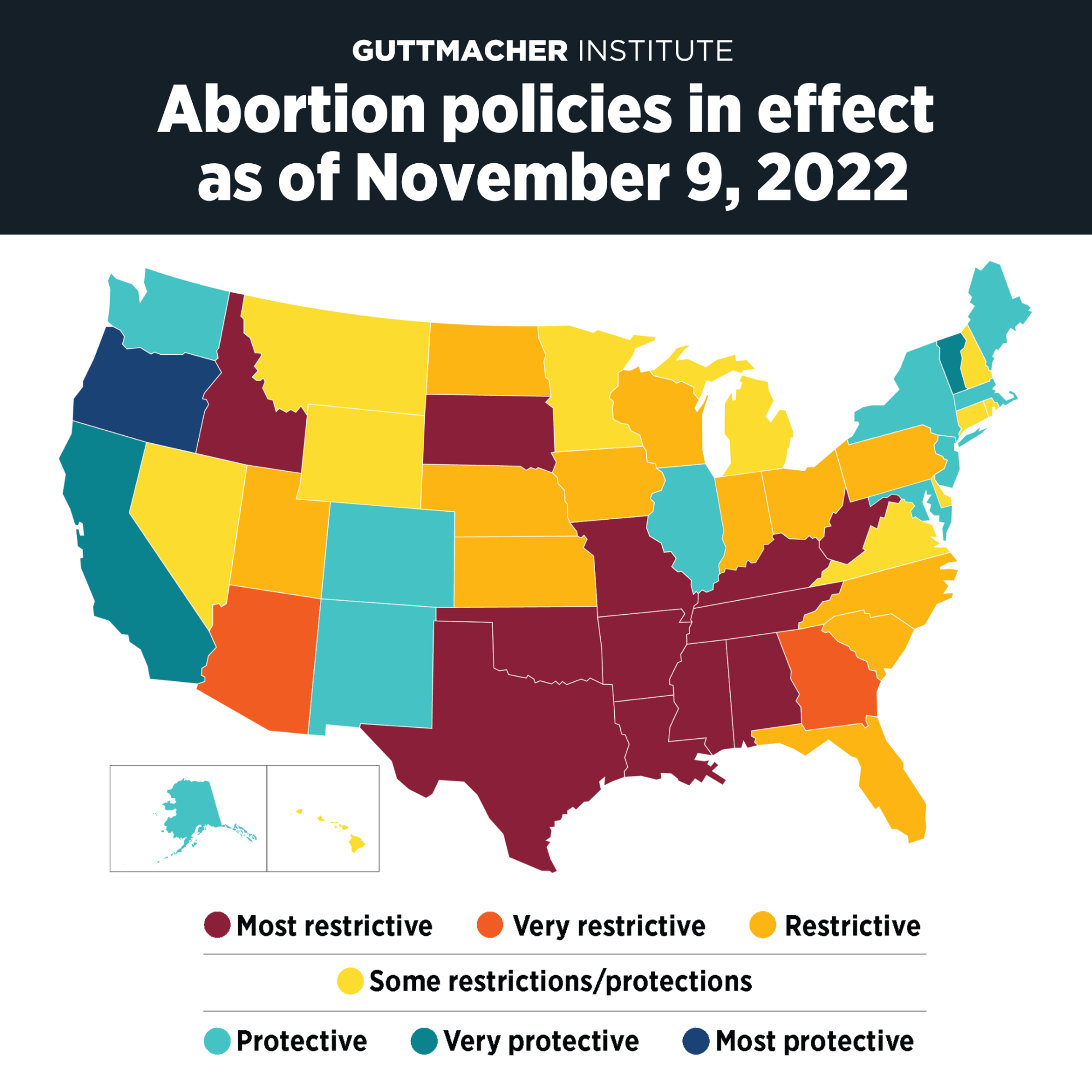
B. Democracy vs. Autocracy
Like Barack Obama before him, Joe Biden has adopted a Manichaean approach of international relations. While Barack Obama was keen on using the phrase “on the right side of history”, Joe Biden’s rhetoric revolves around the democracy vs. autocracy opposition.
By antagonising China and Russia, the US administration embraces a “Cold War mentality” according to Chinese authorities. In fact, the US tries to move away from a multipolar world in which it feels like its global influence is fading. By portraying itself as the champion of the Western world, the US endeavours to regain the prestige it enjoyed at the end of the Cold War.
With the war in Ukraine, NATO experiences a long-awaited revival and the US military industry benefits from increased European spending. In parallel, the US Congress has allocated more than $70 billion to Ukraine (military, financial and humanitarian support), within one year after the beginning of the war.
C. Multilateralism, really?
The current US President has sought to promote multilateralism and to reinforce partnerships with European and Asian allies that felt neglected during Donald Trump’s presidency.
In the Indo-Pacific region, the US has deepen its alliances to counter China’s influence:
- The QUAD → India, Japan, Australia and the US
- The AUKUS → Australia, the UK and the US
- At the expense of France’s submarine deal with Australia that it ditched in September 2021 without prior warning
However, the US emergency withdrawal from Kabul, Afghanistan, in August 2021 was achieved unilaterally without any coordination with its partners, which degraded the US image and reliability on the international stage.

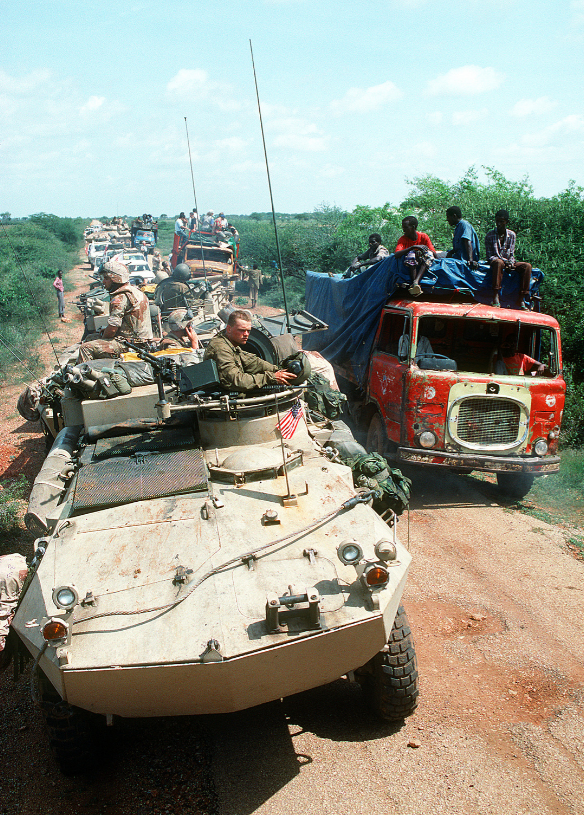
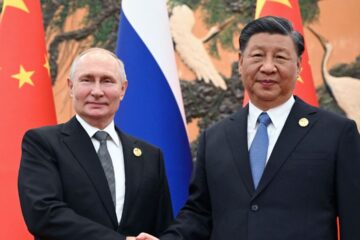
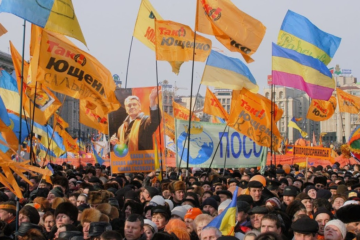

3 Comments
The Colour revolutions in Georgia, Ukraine and Kyrgyzstan – geopol-trotters · 31 December 2023 at 9:47 pm
[…] approach to international relations, which is based on American exceptionalism (more information on US Presidents’ foreign policies), and with President Putin’s willingness to restore Russia’s greatness, we can […]
Summary of Arab-Israeli conflicts since 1948 – geopol-trotters · 10 October 2023 at 3:10 pm
[…] the aegis of the US President Bill Clinton, Yasser Arafat (leader of the PLO) and Yitzhak Rabin (Israeli Prime Minister) signed the Oslo […]
Limits of the power vacuum logic in Africa – geopol-trotters · 14 May 2023 at 4:38 am
[…] powers also tend to antagonise so much Russia, especially under President Biden’s “democracy vs. autocracy” paradigm, that they are unable to question themselves and understand Russia’s attractiveness (that they […]